Happy Monday, everyone!
TÁR has screened in Telluride, Colorado over the weekend and was well-received by the American critics. Coinciding with the US premiere is the tribute to Cate Blanchett and Q&A with her, Nina Hoss, and director Todd Field. While in Telluride, Cate also watched Alejandro G. Iñarritu’s new movie, Bardo.
Cate Blanchett: ‘TÁR’ Shows How ‘Legacy Will Be the Death of Your Artistry’
On Saturday night, after all 157 minutes of “TÁR” played, and a 20-minute highlight reel of her work was shown, the Telluride Film Festival finally brought out Cate Blanchett for a tribute that included awarding her the Silver Medallion, and having an onstage chat with her about the new film in front of an audience that included Anne Hathaway, Jeremy Strong, James Gray, Karyn Kusama, Rooney Mara, Frances McDormand and the rest of Women Talking cast, Paul Mescal, and Phoebe Bridgers.
It was almost fitting to have “TÁR” as the focus of a tribute to Blanchett, given how the film sees her playing a highly accomplished conductor whose world starts to unravel, and actually includes an early scene where her character is also interviewed onstage, having to reflect on her body of work.
What Blanchett herself began to focus on was giving attendees an idea of what happens with performers behind the curtain. “The conductor’s that I spoke to and observed, talked about [an] extreme sense of nerves, and I know that inherently, from having years and years and years working on stage, is that I stand on stage, as I did before I came on here, the worst role you could possibly play is yourself,” said the actress. “I would much rather play Hedda Gabler. That is much easier than playing Cate Blanchett, whoever that is.”
Blanchett called “TÁR,” filmmaker Todd Field’s first release in 16 years, a process film. “I think it’s interesting. You don’t see the performance, you see the process of making something. And that process is indelicate and impolite and full of doubt. And I think that that’s the state that [Lydia Tár] is in personally, as well as professionally.”
She added “the thing that the audience doesn’t see, they think of performers as being supremely confident channels. And performers are riddled with doubt. And that the supreme act of bravery, is coming out and channeling the things through them, not for themselves, but for you guys.” While the enlightening sentiment moved Hathaway to tears, according to a couple of onlookers, Blanchett could not help but add a tag, using a jokingly vulnerable voice to say, “We’re doing it for you guys, it’s all for you.”
Speaking more on “TÁR,” Blanchett shared that she was immediately impressed with how Field’s script depicts an artist in preparation, saying “it was one of the most assured, clear, don’t-need-to-change-a-syllable screenplays that I have ever read in my life,” she also found his directing approach to be a pleasant surprise. “You couldn’t have hoped for a better collaborator than Todd,” said Blanchett. “Even though he’d written the screenplay, I’d say, ‘Wait, hang on, you said this needs to happen, too.’” His response to her would be, “Oh don’t worry about that, the writer wrote that. Don’t worry about it.”
Their collaboration was a long time coming, with Blanchett having been in talks to star in the film Field had been working on with Joan Didion in 2012. “It takes a great deal to get Todd Field to leave his barn to come out and make another movie,” said the actress. “And I think we’re all very grateful that he has done so. But he doesn’t do so unless he has something to say. And he has so much to say in this script.”
One of those things is a statement about legacy, something Lydia Tár is obsessed with. “As an artist, when you get to the top of Mount Olympus, if you’re a genuine artist, you have to blow it all up. Because legacy will be the death of your artistry,” said Blanchett. “So in the end, that’s what I found really noble about the character. But unfortunately, by blowing that up, there’s a lot of casualties. I think that’s the complicated thing about it.”
Cate Blanchett Earns Her First Award (of Surely Many) for TÁR
TÁR, which landed at Telluride after glowing reviews in Venice, sees Blanchett deliver a bombastic performance as the head conductor of the Berlin Philharmonic, who has reached the highest pinnacle of success in her field. ??”She’d made a commitment to herself very, very early on that she would transform herself into something great,” Blanchett said of the character during the Q&A after the screening. “And then what you see in the film is the fact that she’s on that pinnacle, and the only next steps you can possibly make is down — and in artistic life, that is the greatest step you can possibly make.”
In the beginning of the film, the audience is let in on the many habits in Lydia’s life, from her tailored suits and ultra-chic Berlin home to her obsessive handwashing and her intense pre-performance rituals. Blanchett said that she was able to embody Lydia’s flaws because she relates to the anxiety that every performer faces before stepping out onto a stage. “I think that’s the thing that the audience doesn’t see — they think about performers as being supremely confident,” she said. “Performers are riddled with doubt, and the supreme act is coming out and channeling the thing through them, not for themselves, but for you guys.”
Blanchett elaborated more on the way that every performance is a risk, a feeling she’s had in her own work, especially when she’s performed in plays. “Sometimes it may not lift off, but that’s the exciting, dangerous thing,” she said. “And I think that’s the thing that people forget is there’s not some certainty that we know how to do this. Every single time you go on set, every single time you step on stage, every time you step on the podium in front of an orchestra—it may be okay, but it may not be the best they can do.”
And for the extremely small number of major female conductors, there are even more challenges. As Blanchett, who spoke to numerous female conductors in preparation for the role, pointed out: “When they step on the podium, 70% is a political act and they have to spend 70% of their energy pushing aside the fact that they’re female, simply so they can be musicians.”
The further you get into TÁR, the more you begin to realize that all is not well in the life that Lydia has built, and that her past misdeeds may be about to make her life unravel. In the era of #MeToo, Field is using this story to at least in part explore those abuses of power. “Artists are complicated people – they live in the gray areas,” said Blanchett. “And I think these are all the questions that the film asks: in the pursuit of greatness, what do we condone and who supports those things that might destabilize other people?”
Review: Cate Blanchett delivers a Telluride ‘Tár’ de force
When Cate Blanchett took the stage Saturday evening for her Telluride Film Festival tribute, right after a screening of her astonishing new movie, “Tár,” the audience must have enjoyed a bit of a chuckle. Most audiences that get a post-screening Q&A with Blanchett — and there will probably be a few in the months to come — will find themselves in a similar position. In “Tár,” Blanchett plays a world-renowned classical conductor named Lydia Tár, and one of her first scenes is a long, riveting and revealing conversation with the New Yorker writer Adam Gopnik (playing himself), held in front of a live audience.
It’s an instantly captivating sequence, fearless in its musical and intellectual rigor, that hard-wires us into the workings of Lydia’s formidable mind. We drink in her black-suited elegance and sense her initial guardedness, though any anxiety soon melts way as Lydia, as assured a speaker as she is a conductor, begins holding forth about her art, her love for Mahler and Bernstein, and her experiences studying, playing and conducting music all over the world. Her synapses fire like mad and her hands spring to inventive life as she describes her role in not just keeping but creating time, molding and sculpting it with a level of imagination that the audience will detect only as a sublime piece of music.
“Tár,” the third and finest feature directed by Todd Field (“In the Bedroom,” “Little Children”), keeps its own time beautifully. The movie runs a mesmerizing two hours and 38 minutes; I didn’t want it to end. It’s the story of a magnificent monster and her very public downfall, but what makes that downfall so persuasive is that it happens so gradually, and springs forth from some such quietly intimate roots. The story proceeds in carefully orchestrated movements, as it were, and each one of those movements draws us a little deeper into Lydia’s highly influential and rigidly hierarchical corner of the music world.
This is Field’s first movie in 16 years (and his first original screenplay, after two adaptations), and he unleashes what feels like close to a decade’s worth of pent-up, razor-sharp observations about the politics of the art world, the tensions of academia, the debate over cancel culture, the reckonings of #MeToo and, on a not-unrelated note, the ascendancy of women in creative and professional spaces long dominated by white men. And in this space, Lydia refuses — arrogantly, maddeningly and sometimes heroically — to bow to what she sees as prevailing liberal orthodoxies. Hailed as the first woman to conduct one of the world’s great orchestras, she nonetheless dismisses gender inequality as a significant deterrent to her success.
To play Lydia, Blanchett learned to speak German, play the piano and conduct music, but the brilliance of her work goes beyond the conventions of study, practice and research. It takes an actor who can seem, as Blanchett does, like both a gifted orchestrator and a finely tuned instrument in the same instance.
Full review on LA Times
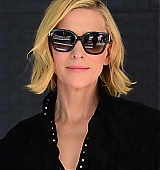
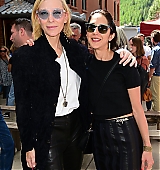
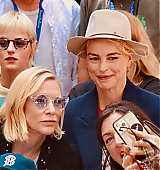
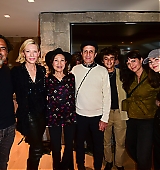




Decades from now when historians are grasping to understand what “cancel culture” meant, they will turn to TAR. Actors, meanwhile, will still be studying Cate Blanchett’s best performance. This isn’t even a movie as much as a world that she just…inhabits. Remarkable. #telluride
— erickohn (@erickohn) September 4, 2022
Tár is a welcome return for Todd Field, with a captivating performance from Cate Blanchett. It’s very long, but largely earns it as a slow burn character study.#Tar #TellurideFilmFestival #Telluride #CateBlanchett #ToddField pic.twitter.com/ADdJkiEJjC
— Joey Magidson (@JoeyMagidson) September 4, 2022
Cate Blanchett’s performance in TÁR is nothing short of Earth shattering. pic.twitter.com/c0kJHAblAH
— Erik Anderson (@awards_watch) September 4, 2022
TÁR is a mesmerizing work of art from Todd Field about the descent of a world famous conductor. Impeccably shot, edited & written. Cate Blanchett’s spellbinding performance commands your attention & suffers no fools. She’s simply operating on a level few others are. Astonishing! pic.twitter.com/0S6F6nLhOQ
— Matt Neglia (@NextBestPicture) September 4, 2022
TAR: Remarkable, haunting, hilarious, devastating, with Cate Blanchett giving a career-best performance. Whew. #Telluride
— David Canfield (@davidcanfield97) September 4, 2022
There is life before TÁR and life after TÁR! Hands down my new favorite film of the year. A truly transcendent experience with an all time great performance by Cate Blanchett! It is so nice to have Todd Field back in the film world. #TellurideFilmFestival pic.twitter.com/hpMDcHtWEy
— Ryan McQuade (@ryanmcquade77) September 4, 2022
Tribute
Cate Blanchett receiving her award at #TellurideFilmFestival pic.twitter.com/bV3Zn87skb
— J Don Birnam (@jdonbirnam) September 4, 2022
Standing ovation for Cate Blanchett following her immaculate performance in #TAR at the #TellurideFilmFestival pic.twitter.com/XNZNZGMKCV
— Matt Neglia (@NextBestPicture) September 4, 2022
Tribute for Cate Blanchett underway at #Telluride
Clips from DON'T LOOK UP (2021), VERONICA GUERIN (2003), BANDITS (2001), ELIZABETH (1998), I'M NOT THERE (2007), NOTES ON A SCANDAL (2004), CAROL (2015), BLUE JASMINE (2014) and THE AVIATOR (2004) https://t.co/VMz4sw0T3D pic.twitter.com/wOy3lY1NPy
— Clayton Davis – Stand with ?? (@ByClaytonDavis) September 4, 2022
Full house standing ovation for Cate Blanchett as she receives the silver medallion from Julie Huntsinger at the #TellurideFilmFestival pic.twitter.com/vUfeCnH0M3
— Erik Anderson (@awards_watch) September 4, 2022
Today I saw Frances McDormand in a concessions line before a screening; eight hour later, Cate Blanchett gets a tribute award at #telluride. Between the three of us, we have five Oscars!! (Ps. CB will get another nom for #TAR). pic.twitter.com/cF9ShlCYjh
— Mara Reinstein (@MaraReinstein) September 4, 2022
BRAVO to 2-time Oscar-winner CATE BLANCHETT, recipient of the SILVER MEDALLION AWARD after the #TELLURIDE North American premiere of “TAR,” in which she is BRILLIANT! pic.twitter.com/2Sm1g1dYRl
— Scott Mantz (@MovieMantz) September 4, 2022
Cate Blanchett’s performance in TÁR is one of her best. Todd Field’s direction alongside Florian Hoffmeister’s cinematography are spectacular. This is by far the most excellently-crafted film and my favorite of the 49th #TellurideFilmFestival this far. pic.twitter.com/Q1BYqX8JnV
— Scott (@oldgraychucks) September 4, 2022
Cate Blanchett tribute following #TAR at Telluride @Variety pic.twitter.com/enfpttgYtA
— Clayton Davis – Stand with ?? (@ByClaytonDavis) September 4, 2022
Impossible to imagine any acting performance this year, male or female, topping Cate Blanchett in TAR.
A colossal role from Todd Fields, and an equally colossal performance by Blanchett. My goodness. #TellurideFilmFestival pic.twitter.com/0nEsYMCtg7
— Ken Fitzpatrick (@krf7) September 4, 2022
The lovely talented CATE BLANCHETT, shared her words tonight
She is the recipient of the SILVER MEDALLION AWARD after the #TELLURIDE North American premiere of “TAR,” in which she is BRILLIANT! #Telluride #Film #CateBlanchett @noordinarylifememoir #maryannbyron pic.twitter.com/XLomUObavs
— Mary A.Byron, Producer, Writer, Global Events (@GlobalEventMary) September 4, 2022
Telluride Film Festival Day 3 – Tribute and Q&A
#TellurideFilmFestival capsule: “Tár” runs 2h 38m but is tight & captivating. Cate Blanchett powerful w/ piercing dialogue from writer/director Todd Field. Beautiful insight from Cate at the tribute conversation. #Tar #CateBlanchett pic.twitter.com/1Z4drGbXkt
— Greg Sorvig (@gsorvig) September 4, 2022
The brilliant and beautiful Cate Blanchett after Todd Field’s TÁR, which is a knockout. More on that soon (after I come back down to planet earth), but this is one of the best films I’ve seen all year (and my favorite thing in the #Telluride line-up so far). pic.twitter.com/dWdDjxJnQi
— Tomris Laffly (@TomiLaffly) September 4, 2022
Attended the Focus Features brunch for #TAR & #ArmageddonTime. Cate Blanchett: approachable & lovely. Jeremy Strong and I talked at length about his performance in AT. Also pictured Todd Field (cap with Cate). Not pictured: James Gray, a literal fountain of cinematic knowledge. pic.twitter.com/hmCGqE0ML2
— Clarence Moye (@ClarenceMoye) September 4, 2022
 Welcome to Cate Blanchett Fan, your prime resource for all things Cate Blanchett. Here you'll find all the latest news, pictures and information. You may know the Academy Award Winner from movies such as Elizabeth, Blue Jasmine, Carol, The Aviator, Lord of The Rings, Thor: Ragnarok, among many others. We hope you enjoy your stay and have fun!
Welcome to Cate Blanchett Fan, your prime resource for all things Cate Blanchett. Here you'll find all the latest news, pictures and information. You may know the Academy Award Winner from movies such as Elizabeth, Blue Jasmine, Carol, The Aviator, Lord of The Rings, Thor: Ragnarok, among many others. We hope you enjoy your stay and have fun! 

 Black Bag (202?)
Black Bag (202?) Father Mother Brother Sister (2024)
Father Mother Brother Sister (2024) Disclaimer (2024)
Disclaimer (2024) Rumours (2024)
Rumours (2024) Borderlands (2024)
Borderlands (2024) The New Boy (2023)
The New Boy (2023) TÁR (2022)
TÁR (2022) Guillermo Del Toro’s Pinocchio (2022)
Guillermo Del Toro’s Pinocchio (2022) Documentary Now!: Two Hairdressers in Bagglyport (2022)
Documentary Now!: Two Hairdressers in Bagglyport (2022)













1 Comment on “49th Telluride Film Festival A Tribute to Cate Blanchett”
Comments are closed.